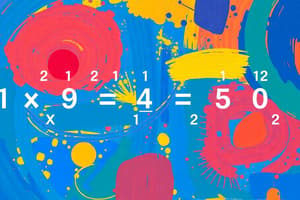Podcast
Questions and Answers
Which of the following strategies involves visualizing numbers on a linear scale to find the difference?
Which of the following strategies involves visualizing numbers on a linear scale to find the difference?
- Decomposing Numbers
- Using Number Lines (correct)
- Counting Back
- Rounding And Adjusting
Counting Back is particularly effective for complex subtractions involving large numbers.
Counting Back is particularly effective for complex subtractions involving large numbers.
False (B)
What is the purpose of rounding numbers in the Rounding And Adjusting strategy?
What is the purpose of rounding numbers in the Rounding And Adjusting strategy?
To simplify the calculation.
To use the Complementary Numbers strategy, one must identify pairs that add up to a specific number, such as _____ .
To use the Complementary Numbers strategy, one must identify pairs that add up to a specific number, such as _____ .
Match the following strategies with their descriptions:
Match the following strategies with their descriptions:
What is an example of using the Decomposing Numbers strategy?
What is an example of using the Decomposing Numbers strategy?
Rounding And Adjusting requires no adjustments after rounding is done.
Rounding And Adjusting requires no adjustments after rounding is done.
How does the Counting Back strategy enhance number sense?
How does the Counting Back strategy enhance number sense?
The process of finding 100 - 37 involves recognizing that 37 + _____ = 40.
The process of finding 100 - 37 involves recognizing that 37 + _____ = 40.
Flashcards are hidden until you start studying
Study Notes
Mental Maths Subtraction Strategies
Using Number Lines
- Visual tool to represent numbers on a linear scale.
- Helps in understanding the relationship between numbers.
- Can show jumps backward to find the difference.
- Useful for visual learners and younger students.
Counting Back
- Start with the larger number and subtract by counting backward.
- Can be done orally or using fingers for smaller numbers.
- Encourages number sense and familiarity with number sequences.
- Effective for simple subtractions, e.g., subtracting single digits.
Rounding And Adjusting
- Round the numbers to nearest ten or hundred to simplify calculation.
- Perform the subtraction with rounded numbers.
- Adjust the result by adding or subtracting the amount rounded.
- Example: 32 - 19 can be rounded to 30 - 20 = 10; then adjust: 10 + 1 = 11.
Complementary Numbers
- Identifies pairs that add up to a specific number (e.g., 10).
- Use known complements to simplify subtraction.
- Example: To calculate 100 - 37, recognize that 37 + 3 = 40, then 100 - 40 + 3 = 63.
- Builds on knowledge of addition to support subtraction.
Decomposing Numbers
- Break down numbers into more manageable parts.
- Useful for larger numbers or more complex problems.
- Example: For 54 - 27, break down 27 into 20 + 7:
- Subtract 20 from 54 to get 34.
- Then subtract 7 from 34 to get 27.
- Encourages flexibility in number manipulation and deeper understanding.
Using Number Lines
- Visual tool for subtraction.
- Helps understand relationships between numbers.
- Shows backward jumps to find differences.
Counting Back
- Start with larger number and count backward.
- Works with smaller numbers.
- Effective for simple subtractions.
Rounding and Adjusting
- Round numbers to nearest ten or hundred to simplify.
- Adjust result by adding or subtracting rounding difference.
Complementary Numbers
- Find pairs that add up to a specific number (e.g. 10).
- Use known complements to simplify subtraction.
Decomposing Numbers
- Break down larger numbers into smaller parts.
- Useful for complex subtractions.
Studying That Suits You
Use AI to generate personalized quizzes and flashcards to suit your learning preferences.



![[Fully_Updated]! Cisco 500-420 Exam Questions For Very Good Results](https://images.unsplash.com/photo-1493836512294-502baa1986e2?crop=entropy&cs=srgb&fm=jpg&ixid=M3w0MjA4MDF8MHwxfHNlYXJjaHw0fHxtZW50YWwlMjBtYXRoJTJDJTIwc3VidHJhY3Rpb24lMjBzdHJhdGVnaWVzJTJDJTIwZGVjb21wb3NpdGlvbiUyQyUyMG1hdGhlbWF0aWNzfGVufDF8MHx8fDE3MzI2OTQ0OTN8MA&ixlib=rb-4.0.3&q=85&w=300&fit=crop&h=200&q=75&fm=webp)
